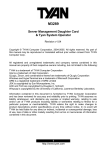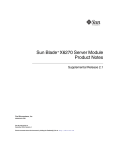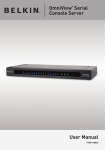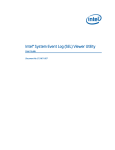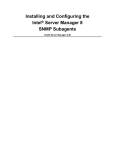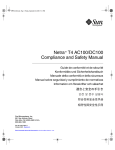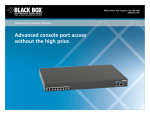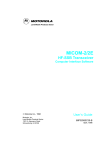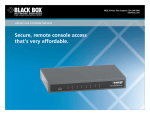Download Tyan Computer M3291 Security Camera User Manual
Transcript
M3291/3295 Server Management Daughter Card & Tyan System Operator Revision V2.00 Copyright © TYAN Computer Corporation, 2006-2007. All rights reserved. No part of this manual may be reproduced or translated without prior written consent from TYAN Computer Corp. All registered and unregistered trademarks and company names contained in this manual are property of their respective owners including, but not limited to the following: TYAN is a trademark of TYAN Computer Corporation Intel is a trademark of Intel Corporation Renesas is trademark of Renesas Technology Corporation Windows and HyperTerminal are a trademark of Microsoft Corporation ARM is a registered trademark of ARM Limited JDK is copyrighted by Sun Microsystems, Inc. ACE and TAO are copyrighted by Douglas C. Schmidt Winpcap is copyrighted by the University of California, Lawrence Berkeley Laboratory Information contained in this document is furnished by TYAN Computer Corporation and has been reviewed for accuracy and reliability prior to printing. TYAN assumes no liability whatsoever, and disclaims any express or implied warranty, relating to sale and/or use of TYAN products including liability or warranties relating to fitness for a particular purpose or merchantability. TYAN retains the right to make changes to product descriptions and/or specifications at any time without notice. In no event will TYAN be held liable for any direct or indirect, incidental or consequential damage, loss of use, loss of data or other malady resulting from errors or inaccuracies of information contained in this document. 1 http://www.tyan.com Table of Contents Box Contents About this Manual Chapter 1: Overview 1.1 What are SMDC? 1.2 SMDC and TSO 1.3 OPMA and M3295 1.4 Features of Tyan Server Management 1.5 How SMDC and TSO work 1.6 Operating System Compatibility Chapter 2: M3291 Hardware Information 2.1 M3291 Card Images 2.2 M3291 Card Layouts 2.3 M3291 Jumper Setting 2.4 M3291 Card Installation Chapter 3: M3295 Hardware Information 3.1 M3295 Card Images 3.2 M3295 Jumper Setting 3.3 M3295 Card Installation Chapter4: Software Installation 4.1 Firmware Update 4.2 Configuration 4.3 Open Sourced IPMI Software Chapter 5: TSO Information 5.1 What is TSO 5.2 TSO Connection Models 5.2.1 Simple Intranet Model-1 5.2.2 Simple Intranet Model-2 5.2.3 Simple Intranet Model-3 5.2.4 Complex Intranet Model 5.3 TSO Access Model 5.4 Features 5.5 Pre-setup and Installation 5.5.1 Pre-setup 5.5.2 Installation 5.5.3 Run TSO 5.6 TSO Access 5.6.1 In-Band Access 5.6.2 Out-of-Band Access 5.6.3 Discovery Setting Chapter 6: Troubleshooting Technical Support Appendix A: M3295 OPMA Interface Pin definition table Appendix B: OPMA Signals grouped by Function 2 http://www.tyan.com Page 3 Page 4 Page 5 Page 5 Page 6 Page 7 Page 11 Page 11 Page 12 Page 12 Page 13 Page 14 Page 17 Page 17 Page 17 Page 19 Page 21 Page 24 Page 27 Page 28 Page 28 Page 28 Page 29 Page 30 Page 31 Page 32 Page 33 Page 33 Page 34 Page 38 Page 40 Page 40 Page 42 Page 46 Page 47 Page 51 M3291 Box Contents The retail M3291 package should contain the following: 1 x TYAN System Management Daughter Card 1x 50-pin Ribbon Cable 1 x Serial-to-Serial Cable 1 x Standard PCI Bracket 1 x Low Profile PCI Bracket 1 x HD Bay Bracket (Option) 1 x SMDC & TSO User’s Manual(Option) 1 x TYAN TSO CD M3295 Box Contents The retail M3295 package should contain the following: 1 x TYAN System Management Daughter Card 1 x SMDC & TSO User’s Manual(Option) 1 x TYAN TSO CD If any of these items are missing, please contact your vendor/dealer for replacement before continuing with the installation process. 3 http://www.tyan.com About this Manual This manual is designed to provide the basic information for the SMDC M3291/3295. It includes the introduction of hardware, software and general troubleshooting procedures. Chapter 1: Overview – Includes the basic introduction of SMDC, TSO, OPMA and M3295, and Server Management. Chapter 2 and Chapter 3: M3291, M3295 Hardware Information – Introduces the hardware information, including card features, specification, components, jumper setting and installation procedure. Chapter 4: Software Installation – Introduces details on how to install software, update firmware and configurations, as well as introducing some open source IPMI software. Chapter 5: TSO Information – Introduces the software information of TSO (Tyan System Operator), including features and how SMDC and TSO work. Chapter 6: Troubleshooting – Provides the general troubleshooting procedures the users will meet in their daily work, effectively reducing the problems happened in the process of server management. 4 http://www.tyan.com Chapter 1: Overview Servers today provide the necessary resource for corporate databases, financial and statistical analysis data, military defense networks, and much more. To act as the heart and soul of any network, servers must be infallible or near infallible. There must be competent management of IT resources at all times in order to keep servers and networks running smoothly and without incident. However, most network and server administration staff can just provide part of that support, they cannot be present 24 hours a day, 7 days a week, on a constant 365-day calendar. To help provide a solution for constant vigilance, the server remote management card eliminates the problem of having an administrator on call at all times. Tyan has the entire package to manage servers and networks. This makes the Tyan solution one of the most complete IT resource tools available. 1.1 What are SMDC? The Tyan Server Management Daughter Card (SMDC) is a powerful, yet cost-efficient, solution for high-end server management hardware packages. The SMDC provides remote system monitoring and control even when the operating system is absent or fails, and empowers server boards with advanced industry standard features. It effectively enables IT Managers to have remote and multi-interface access to monitor, control, and diagnosing activities. The SMDC is powered by an intelligent controller known as the Baseboard Management Control (BMC). The BMC is a standalone mini-CPU that runs on its own Real Time Operating System (RTOS) to complete a variety of tasks. Backed by Renesas reliable H8 technology, systems are consistently monitored and supported. Unlike regular cards such as AGP cards, network cards or SCSI cards, the SMDC is not a peripheral card that requires any hardware specific driver. As long as standby power supports the system, the SMDC will monitor the system. The Tyan SMDC M3291/3295 provides many diverse methods to communicate with the hardware. There is flexibility to choose among Keyboard Controller Style (KCS), Intelligent Platform Management Bus (IPMB) and standard IPMI-Over-LAN The Tyan SMDC communication as defined in latest IPMI 2.0 specification. M3291/3295 is compatible with all IPMI-compliant software as well as with the Tyan System Operator™ (TSO) 2.0 software package. The SMDC hardware is OSindependent and TSO is fully compatible with all major Operating Systems. 1.2 SMDC and TSO The TSO is software made by Tyan which acts as a front end client that provides additional functionality for the SMDC. The SMDC and TSO offer remote management over servers. The remote management gives the ability to monitor and control remote resources, such as temperature monitoring, fan control, turning system on/off, or modifying system settings remotely. 5 http://www.tyan.com 1.3 OPMA and M3295 OPMA stands for Open Platform Management Architecture which is initiated by AMD. It defines a common hardware interface between the server platform and its server management subsystem. M3295 is OPMA compatible card. It’s also compatible with IPMI 2.0 and has dedicated management NIC support. Dedicated management NIC provides high performance and reliability. Interface Management NIC M3291 Tyan 2X25 Connector Side-band(Shared) M3295 AMD OPMA Dedicated The specification is available for download from AMD website http://www.amd.com/us-en/Processors/ProductInformation/0,,30_118_8796_12498,00.html OPMA spec defines three basic sets of functionality labeled M1, M2, and M3. M1—The Value Solution • Main feature = price • IPMI 1.5 compatible • No dedicated manageability NIC M2—Reasonable Price with Security and Performance • M1 base features plus dedicated management NIC − Provides high performance and optimal security • Access to hardware health data through BMC-based web server − Implies a more powerful BMC CPU core, larger address space, more flash and RAM • Remote virtual mass storage M3—High-End Solution with Graphics Console Redirection • Features of the M3 functional tier are M2 plus KVMoIP*. *KVMoIP---Keyboard, Video, and Mouse over Internet Protocol. Used for implementing remote video consoles on headless (i.e., no local keyboard mouse or display) servers. 6 http://www.tyan.com 1.4 Features of Tyan Server Management Monitor various system components remotely - such as fans, processor temperature, and more Remote power on and power off Console redirect -the ability to view system remotely Alert and error actions -such as audible beep, e-mail, power down and reboot SMDC runs on stand-by power -the SMDC will continue to function, even if the system is not powered on General Features of SMDC Feature BMC IPMI FRU SDR SEL GPIO IPMB IPMI-Over-LAN Remote Host Control Remote Sensor Monitor Remote Diagnostic BMC Firmware Update ASF TSO Description Renesas H8 2167 Version 2.0 Spec “Field Replaceable Unit” Information Storage Sensor Data Record Sensor Event Log “General Purpose Input and Output” lines for future expansion. Intelligent Platform Management Bus Remote sensor monitor, host control and system diagnose Power up, down, reset, power cycle or NMI through LAN port SMDC provides sensor information as long as BMC receives enough operating power. SMDC allows for system diagnostic when the system is not in operation (both intentionally or accidentally) through remote IPMI command execution. SMDC supports onboard update of the BMC firmware. Alert Standard Forum Tyan System Operator ™ The SMDC M3291/3295 is equipped with the following features: Hardware Monitoring Protocol and Standard Enhanced Authentication Encryption Support 7 http://www.tyan.com Firmware Firewall Auxiliary Communication Interface 2 Auxiliary SMBus / I C buses Teamed with other IPMB Devices (PMCs and EMCs) Remote Monitor, Control and Diagnostics Remote Console Redirect over LAN(SOL) Sensor Data Record System Event Log Field Replaceable Unit Information Storage Upgrade BMC firmware “Always Ready” TYAN System Operator ™ (TSO) Standard or OEM Drivers Hardware Monitoring The latest hardware from TYAN is equipped with Baseboard Management Controller (BMC) from Renesas H8 which provides not only system monitoring but also remote manageability. The BMC can always monitor the hardware regardless of how the operating system is running. With the BMC onboard, any IPMI-compliant software can monitor, control or diagnose the hardware locally, or from a remote site. Protocol and Standard • Intelligent Platform Management Interface (IPMI) 2.0 • Remote Management and Control Protocol (RMCP) for IPMI-Over-LAN • Alert Standard Forum (ASF) Auxiliary Communication Interface (Other standard devices that the SMDC communicates with) • IPMB = Intelligent Platform Management Bus • LAN = Local Area Network Enhanced Authentication Support new algorithms that provide more robust key exchange process for establishing sessions and authenticating users. Encryption Support IPMI message and other payload carried over RMCP+ can be encrypted. This enable confidential remote configuration of parameters such user passwords and transfer of sensitive payload data over SOL. Firmware Firewall Firmware Firewall is the name for a collection of commands that enable a BMC implementation to restrict the ability to execute certain commands or functions from a given interface. This can be used to protect against operations that errant or malicious software may used to affect the managed system or other systems. Auxiliary SMBus / I2C buses 8 http://www.tyan.com The SMDC provides 4 dedicated and independent buses for user expansion. Many devices including Northbridge, Southbridge, Super I/O, Hardware Monitor, LAN 2 2 controller, etc., provide I C communication. These I C buses bridge the proper communication between these devices. Teamed with other IPMB Devices (PMCs and EMCs) Numerous devices in the market already support IPMB communication. BMC facilitates the control and management of these devices. PMC stands for Peripheral Management Controller and EMC stands for Enclosure Management Controller. Depending on the overall set up of the system, the SMDC could initialize and communicate with other PMC/EMC residing on the same IPMB bus. Simply connect the devices to the designated IPMB connector. Available PMC/EMC options include: • Satellite controller - SCSI RAID controller unit • Power supply - power supply unit that has a hardware monitoring chip inside Remote Monitor, Control and Diagnostics Sensor Monitor • Voltage • Temperature • Tachometers • Fan Speed Control / PWM • Chassis Intrusion Control Command Set • Power Up • Power Down • System Reset • System Power cycle • System NMI • Watchdog Timer Diagnostic Command Set • Power-Good Detection • CPU Voltage Identification (CPU VID) • ACPI State Detection • Request Message Redirection through IPMB • Remote Console Redirection over LAN Remote Console Redirect over LAN Remote Console Redirection allows IT managers to effectively control and maneuver text console of a remote machine. Serial console information goes through the M3291/3295 SMDC and is processed over the network. TSO software then reproduces the exact text console at a remote location. For example, someone may own a group of servers at a remote location and could change options of those servers from a completely separate location. Another example is that one may log in to the Linux serial console through M3291/3295 SMDC over the network. See SMDC installation section for details. 9 http://www.tyan.com Sensor Data Record (SDR) Each sensor has its own corresponding characteristics. They are built according to IPMI standard to provide users the most information possible about a sensor. Details such as measuring units and calibration factors are available while they are not provided in traditional hardware monitoring systems. SDR is specific to motherboard. Tyan provides a utility to easily upgrade the BMC firmware to support each motherboard model. System Event Log (SEL) A complete history of system events such as POST events are stored and secured in non-volatile memory. Critical events within the server detected by the BMC are recorded in the SEL. Certain pre-programmed actions may take place such as system reboot or system shutdown. Field Replaceable Unit Information Storage (FRU) Chassis, Board, Product and other important service information are stored and secured in an area generally known as FRU. Upgrade BMC Firmware The BMC supports Firmware Flash through IPMI firmware commands. The Firmware is stored in boot block flash part. The boot block section code is normally programmed infactory and it provides protection against accidental flash failure or power loss. BMC Firmware may be upgraded from a remote console running Tyan System Operator (TSO). See TSO section for details. “Always Ready” SMDC runs on stand-by power; all monitoring and alerting operations of BMC can begin full operation by using only standby power. Tyan System Operator ™ (TSO) TSO is a software tool created specifically for IPMI-compliant systems with SMDC. It intends to provide IT managers the ability to monitor, control and diagnose their Tyan server boards with ease and flexibility in a remote configuration. See Chapter 3: Software Information for further details. Standard or OEM Drivers M3291/3295 can use standard IPMI driver on Windows on LINUX. Tyan may provide driver support for other third party software at request. Contact your Tyan support representative for more details. 10 http://www.tyan.com 1.5 How SMDC and TSO work The brief descriptions below will help explain how these items function. For further, more in-depth descriptions, please refer to Chapter 3: Software information. Agent – a system with SMDC installed The SMDC is installed in the Agent system that uses a compatible/supported Tyan motherboard. Manager – manages the Agent The Manger is set up to manage the Agent that has the SMDC. The Manager and Agent should be in same subnet. Console – communicates with Manager The Console is used to monitor and control the Agent through the Manager. 1.6 Operating System Compatibility SMDC is OS-independent. And TSO, the remote management software is compatible with the following operation systems: Microsoft® Windows® 2000 Windows® XP (32/64-bit) Windows® Server 2003 (32/64-bit) Red Hat® RH Linux 7.2, 7.3, 8.0, 9.0 (32/64-bit) Adv. Server 2.1, 3.0, 4.0 (32/64-bit) SuSE® SuSE Enterprise Server 8.0, 9.0 (32/64-bit) Professional 9.0, 9.1, 9.2,9.3,10.1 (32/64-bit) TYAN reserves the right to add support or discontinue support for any OS with or without notice. 11 http://www.tyan.com Chapter 2: M3291 Hardware Information 2.1 M3291 Card Images 2.2 M3291 Card Layouts 12 http://www.tyan.com 2.3 M3291 Jumper Setting Label J1 Header Type/Part HDR25X2_SVM_A J2 COM Port J3/J4 TX/RX Switch RTS/CTS Switch Description SVM Edge Connector A Signal remapped for M/B COM2 (9Pin GND) BMC Serial redirect Pin Layout Pin 1 Pin 2 Pin 3 Pin 4 Pin 5 Pin 6 Pin 7 Pin 8 Pin 9 3-5,4-6 Close 1-3,5-7, 2-4,6-8 Close J5 J6 HUDI IPMB Connector For ICE debug use Connect with I2C0 of BMC J7 IPMB Connector Connect with I2C1 of BMC JP1 HDR2 BOOT Mode JP2 HDR2 GPIO56 JP3 HDR2 BMC Reset JP4 HDR3 5V power backup JP5 HDR2 GPIO85 13 http://www.tyan.com DTR DTR TX CTS RX RTS NC NC GND BMC serial connects to J2 BMC serial connects to Serial MUX Pin 1 SDA Pin 2 GND Pin 3 SCLK Pin 4 NC Pin 1 SDA Pin 2 GND Pin 3 SCL Pin 4 NC Close to set BMC in Boot Mode Pin 1 GPIO56 Pin 2 GND Close to Set BMC in Reset Pin 1 GND Pin 2 5V Pin 3 GND Pin 1 GPIO85 Pin 2 GND 2.4 M3291 Card Installation Before you begin, please take the following precautions: (1) Ground yourself properly before removing the SMDC from the antistatic bag. Unplug the power cord from your computer power supply and then touch a safely grounded object to release static charge (i.e. power supply case). For the safest conditions, TYAN recommends wearing a static safety wrist strap. (2) Hold the SMDC by its edges and do not touch the bottom of the card. (3) Avoid touching the SMDC components such as IC chips or connectors. (4) Place the SMDC on a grounded antistatic surface or on the antistatic bag that the board was shipped in. (5) Inspect the card for damage. Note: This installation guide assumes that the user has already completed installing their motherboard and chassis. You can install the SMDC card to your motherboard in three easy steps. Make sure your system is powered off first. Step 1: Find the dedicated location to mount the SMDC. There are four possible ways to mount the SMDC card. 1. Full-size PCI bracket mounting solution 2. Half-size PCI bracket mounting solution 14 http://www.tyan.com 3. Direct mounting to TYAN Chassis solution 4. Hard Driver size bracket mounting solution Step 2: Connect 2x25 ribbon cable between Tyan motherboard SMDC connector and Tyan SMDC J1. Make sure that the key on the ribbon cable aligns with the key on the connector, and that the red line on the ribbon aligns with pin 1 of the connector. 15 http://www.tyan.com Step 3: Connect 2x5 ribbon cable between Tyan motherboard COM2 connector and Tyan SMDC J2. (Check with www.tyan.com SMDC FAQ for J2 connector) Make sure that the key on the ribbon cable aligns with the key on the connector, and that the red line on the ribbon aligns with pin 1 of the connector. Step 4: Locate the onboard “SMDC-Link” Network Interface Controller (NIC) on Tyan motherboard. (M3291 uses one of motherboard onboard NIC for IPMI out-ofband. Before using, please make sure which port M3291 used. You can refer to http://www.tyan.com/support/html/faq_tso.html motherboard Illustration Picture) 16 http://www.tyan.com Chapter 3: M3295 Hardware Information 3.1 M3295 Card Images LED Renesas H8S2167 J1 Reset Jumper Davicom DM9000A 3.2 M3295 Jumper Setting Label J1 Header Type/Part Reset Description M3295 BMC Reset Jumper Pin Layout 3.3 Card Installation Before you begin, please take the following precautions: (6) Ground yourself properly before removing M3295 from the antistatic bag. Unplug the power cord from your computer power supply and then touch a safely grounded object to release static charge (i.e. power supply case). For the safest conditions, TYAN recommends wearing a static safety wrist strap. (7) Hold M3295 by its edges and do not touch the bottom of the card. (8) Avoid touching M3295 components such as IC chips or connectors. (9) Place M3295 on a grounded antistatic surface or on the antistatic bag that the board was shipped in. (10) Inspect the card for damage. Note: This installation guide assumes that the user has already completed installing their motherboard and chassis. You can install M3295 card to your motherboard in three easy steps. Make sure your system is powered off first. 17 http://www.tyan.com Step 1: Insert the card with a degree about 45º into the OPMA socket on the motherboard. Step 2: Press down the card into the socket. Step 3: When properly seated, the retention clips lock into position. 18 http://www.tyan.com Chapter 4: Software Installation 4.1 - Firmware Update 1. Verify/flash Tyan motherboard system BIOS with the SMDC support M3291/M3295 need BIOS support. So before using M3291/3295, please make sure BIOS you used is IPMI enabled. If not, please update BIOS first. Users can refer to http://www.tyan.com/support/html/faq_tso.html SMDC Support List If you wan to know the detail about BIOS for IPMI, please refer the M3291/3295 FAQ. 2. Broadcom NIC Firmware Update It’s M3291 only. M3295 use dedicated NIC. So there’s no such requirement for M3295. Some motherboards use Broadcom NIC as IPMI side-band NIC. User must load Broadcom NIC ASF firmware to enable the IPMI function. Users can get them from M3291/3295 Driver CD or Tyan website. 1) 2) 3) copy all file to floppy boot to DOS run “asf5704.bat” or “asf5721.bat” to flash the Broadcom NIC firmware 19 http://www.tyan.com 4) 3. After flashing finish, choose [9] save and exit M3291/3295 Firmware Update When M3291/3295 production, it will load one default firmware. But it’s impossible to fit every motherboard. So before using M3291/3295, User also need update M3291/3295 motherboard specified firmware. M3291/3295 Driver CD contains the firmware file. User also can get the latest firmware from Tyan website. Tyan provide both DOS and Linux utility for firmware updating. The firmware release packages include these two utility already. User only need execute “dosfls” or “./linuxfls” 20 http://www.tyan.com 4.2- Configuration Before using M3291/3295, users need do some configuration first, such as IP Address. Otherwise some IPMI function won’t work. Users can use the standard IPMI software to set. And Tyan also provide some utilities to do them. The most important configuration are LAN Configuration and User Password Setting. File “m3291.cfg” contains the default setting value of M3291/3295. User can use utility to load this configuration file and restore the M3291/3295 default setting. Tyan provide following utilities. 1) UH8.EXE M3291/3295 Full Version Utility on DOS. \ It supports SEL, SDR, FRU, SENSOR viewer and editor. 21 http://www.tyan.com 2) UH8D.EXE M3291/3295 Thin Version Utility on DOS It support do configuration via command line. “uh8d /?” for the detail usage. 3) UH8L M3291/3295 Utility on Linux. It use its own user space driver. So don’t use any other IPMI driver when using this utility “./uh8l –h” for detail usage. 22 http://www.tyan.com 4) 1. UH8W.EXE M3291/3295 Utility on Windows UH8W.EXE depends on the Intel IPMI Reference Driver. So users must install it when using this utility. About Intel IPMI Reference Driver installation, please refer to M3291/3295 FAQ. LAN Configuration 1) IP Address Users can set M3291/3295 IP Address as they want. Following is the instruction about how to set IP with Tyan utilities. “uh8d /ip=xxx.xxx.xxx.xxx” “./uh8l –I xxx.xxx.xxx.xxx” “uh8w /ip=xxx.xxx.xxx.xxx” 2) 3) 4) 5) M3291 MAC Address Normally user need not set MAC address, but users need check if the MAC address is right. For Intel 82551 and 82546 NIC, M3291 use the same MAC address with system OS. Tyan IPMI enabled BIOS will load it automatically. If not, user can set it manually For Broadcom 5704 and 5721 NIC, M3291 use the different MAC address with system OS. Every M3291 will be assigned one unique MAC when production. When users flash firmware, parameter “imac” will load this MAC from M3291 and write to LAN Configuration. M3295 MAC Address M3295 uses dedicated management NIC. So user need not set MAC address also. Parameter “imac” is Tyan utility also can be used to load M3295 MAC and write to LAN Configuration. Net Mask, Gateway and Broadcast ARP Users need check if these parameter are correct. If use Intel 82551 and 82546 as IPMI NIC, Broadcast ARP must be enabled DHCP 23 http://www.tyan.com 5) 2. Due to NIC hardware limitation, not all the IPMI NIC support DHCP. Right now, only Broadcom, Intel 54x/56x/57x and M3995 dedicated LAN support DHCP. nd Broadcom NIC 2 MAC mode On Broadcom NIC, M3291 use the 2nd MAC address mode. It’s to say, M3291 use different MAC with system OS. You can take them as different logical entity, they use different MAC, different IP. But they share the same physical port. User Password Setting M3291/3295 default supports 5 users: NULL User ID 1, user name is empty Operator User ID 2 Admin User ID 3 Callback User ID 4 User. User ID 5 Their default passwords are same with the user name. Users can change M3291/3295 username and password as they want. But Tyan utility only support user password changing. 4.3- Open Sourced IPMI Software 1. IPMITOOL IPMITOOL is an open source IPMI software(http://ipmitool.sourceforge.net) . It supports Linux and Solaris. Users can use it to view most of IPMI jobs remotely. Detail please refer to ipmitool man page: http://ipmitool.sourceforge.net/manpage.html . IPMITool 1.8.2 have some issue and only partly work on M3291/3295. Please use the latest code from CVS server. Following are some examples. 24 http://www.tyan.com SEL Power Control 25 http://www.tyan.com Serial Over LAN (SOL) 26 http://www.tyan.com Chapter 5: Software Information Tyan System Operator (TSO) is an IPMI-aware management tool for systems based on TYAN motherboards. Through TSO, Users have an easier way to remotely access system health information, do system maintenance and make the running systems much safer. 5.1 What is TSO Three Components The specially designed software TSO (Tyan System Operator) includes three components: z z z TSO MANAGER TSO AGENT(optional) TSO CONSOLE TSO supports the following operating system: Windows 2000, Windows XP Pro (32/64-bit) and Windows Server 2003 (32/64-bit) RedHat 7.2, 7.3, 8.0 and 9.0, Server 2.1, 3.0 and 4.0 (32/64-bit) SuSE Server 8.0, 9.0, Professional 9.0, 9.1, 9.2 and 9.3 (32/64-bit) MANAGER MANAGER is the core component of TSO. It provides communication between CONSOLE and AGENT. MANAGER is normally installed at the gateway or proxy machine in the subnet AGENT(optional) AGENT runs on a target system which is to be managed. AGENT is normally installed at a data-server or email-server machines. As IPMI improvement, most of IPMI function can be done under out-of-band, users don’t need install AGENT normally. CONSOLE CONSOLE provides GUI (Graphic User Interface) for an administrator to perform all management functions. 27 http://www.tyan.com 5.2 TSO Connection Models 5.2.1 Simple Intranet Model-1 z z TSO MANAGER and CONSOLE can be loaded onto the same system TSO AGENT can only work over Tyan server motherboards (Check www.tyan.com TSO FAQ) 5.2.2 Simple Intranet Model-2 z z TSO MANAGER and CONSOLE can be loaded onto two separate systems TSO AGENT can only work over Tyan server motherboards (Check www.tyan.com TSO FAQ) 28 http://www.tyan.com 5.2.3 Simple Internet Model-3 z z TSO MANAGER and CONSOLE can be loaded onto two separate systems TSO AGENT can only work over Tyan server motherboards 29 http://www.tyan.com 5.2.4 Complex Internet Model z z z TSO MANAGER and CONSOLE can be loaded onto separate systems TSO AGENT can only work over Tyan server motherboards (Check www.tyan.com TSO FAQ) All TSO CONSOLE systems can log in different MANAGER to read/control AGENT systems 30 http://www.tyan.com 5.3 TSO Access Model z z z z z z In-Band ¾ MANAGER talks to AGENT system through the OS and AGENT services ¾ In-band can only function when the OS and AGENT services are running Out-Of-Band ¾ MANAGER talks to AGENT system through the BMC chip of the SMDC ¾ Out-of-band can function with or without the OS and Agent services. Access Authentication ¾ MANAGER/AGENT/SMDC Authentication In-Band Access CONSOLE needs to (1) pass the MANAGER Authentication and (2) pass the AGENT Authentication to access all In-Band features Out-Of-Band Access CONSOLE needs to (1) pass the MANAGER Authentication and (2) pass the SMDC Authentication to access all Out-OfBand features External-IP and Internal-IP 31 http://www.tyan.com 5.4 Features Remote System Health Monitoring & Alerting Remote monitor system’s health, including voltage, temperature, fan and so on. Log event when error occurs and alert by beeping, emailing administrator, or doing power down/reboot, according to customizable settings. z IPMI related information browsing Browse FRU, SDR, Sensor Reading and SEL. Both raw data and interpreted data are displayable, and selectable by user z System status reporting Report system health information in fixed period. Report system power state (On/Off). Report system information source (BMC or Hardware Monitor). z Remote IPMI command execution Remote execute IPMI command according to IPMI specification. Remote System Maintenance z Remote update BMC firmware if BMC is available.(optional) z Modify SDR information to affect system monitoring and alerting User can modify the event trigged thresholds per sensor and set alert actions per sensor. So as to customize the system’s IPMI settings. z Watchdog User can enable the watchdog to doing reboot when OS is dead. z Gracefully system power control Remote power down / reboot the system gracefully. Wake the system on LAN. Hard system power control through IPMI-over-LAN Remote power up/power down/reboot the system through IPMI-over-LAN. BMC must be available. z Server Grouping Servers under monitoring can be grouped according to user’s demands. z Server viewing based on group Servers are organized in different groups. User can do the grouping according to the demands. Security Actions taken on the server are authenticated based on the user privilege. 32 http://www.tyan.com User account management Add, modify and delete user. Assign privilege to user on the specific server. z 5.5 Pre-setup and Installation 5.5.1 Pre-setup Authentication and Privilege TSO provides security access with MANAGER Authentication, Agent Authentication and SMDC Authentication. User needs to prepare the privilege information (user-name and password) for each system in order to access target system. z z No password is prohibited Case sensitive under Linux and Out-of-Band Internal-IP and External-IP TSO requires Internal-IP and External-IP setup by user during the TSO installation. User needs to make sure the IP matching with Network Interface Controllers (NIC). z Configuration I If CONSOLE is often being used outside of the subnet in which all/some machines are equipped with SMDC, the machine that runs MANAGER would have 2 NIC’s. MANAGER will likely be installed at the gateway or proxy machine in the subnet. ¾ ¾ z Configuration II If CONSOLE is being used inside the same subnet, the machine that runs Manager may have only 1 NIC. MANAGER can be located on any machine in the network. Notice that MANAGER and CONSOLE need not be installed on the same machine even though they can/may be install on the same machine. ¾ ¾ z Configure Internal IP to be a valid IP under this subnet. This subnet is typically known as a Local Area Network (LAN). The IP would look like this for example: 192.168.1.1, 192.168.1.254 Configure External IP to be a valid IP under the main network. This main network is typically known as a Wide Area Network (WAN). This IP would be a ‘true’ IP, meaning it is the one and only one among all the machines in the world. The IP would look like this for example: 206.13.28.12, 216.239.53.99 Configure Internal IP to be a valid IP under this subnet. Configure External IP to be the same as Internal IP. Firewall Firewall setup information: TSO MANAGER and CONSOLE will use the following 4 ports for firewall setup. ¾ TCP: 20010 21020 33 http://www.tyan.com 21021 21030 21031 ¾ UDP 624 7777 20040 20060 For RedHat Firewall (IPTABLES) Setup 1. Type "setup" to execute the setup utility 2. Select "Firewall Configuration" 3. Select "Customize" 4. Select "Other Ports" 5. Type "20010:tcp, 20040:upd, 20060:udp, 21020:tcp" 6. Select "OK 5.5.2 Installation z Installation Procedures under Linux System (via KDE or Gnome GUI Interface) Put the TSO CD into the CD-ROM drive. You will see a TSO CD-ROM icon on the screen. 1. Click on TSO CD-ROM 2. Click on the menu “install.sh” 3. You will see the screen of “Run or Display”. Choose and click “Run in Terminal”. You will see the screen with four choices: TSO Agent/TSO Manager/TSO Console/Exit. Type the number you want to install. Agent: - Select one of network interfaces to bundle (0 or 1). - Press Enter to complete installation. Manager: 34 http://www.tyan.com - Select one of external network interface to bundle. - Press Enter to complete installation. Console: - Select one of external network interfaces to bundle. - Press Enter to complete installation. 4. After finishing the installation, select Exit to leave the screen. 35 http://www.tyan.com z Installation Procedures under Windows System Agent 1. Put the TSO CD in the CD-ROM drive. 2. Click on the “TSO” item. Select “TSO Server Agent”. 3. Click on “Next” to start the installation procedure. 4. Indicate the Server Agent’s computer name. 5. A License Agreement menu will pop up. Click “Yes”. 6. Click on “Next” after confirming the use of destination directory. 7. Click on “Next” to confirm the setting. 8. Click on “Finish” to finish the installation. Manager 1. Insert TSO CD into CD-ROM drive. Select “TSO”. 2. Double click “TSO Manager”. 3. Double click “INSTALL SUN JDK1.4J_02”. 4. You will see a Welcome menu. Click “Next”. 5. A License Agreement menu will pop up. Click “Yes”. 6. After confirming the destination location of software, click “Next”. 7. Select all the components and then click “Next”. 8. The software will link with IE. Click “Next”. 9. Click “Finish” to finish “Javk2 SDK installation. 10. Go back to TSO manager installation menu. Select “INSTALL WINPCAP”. 11. Installation Wizard will show up. Click “Next”. 12. Click “Next” if you agree with License Agreement. 13. Click “OK” to finish WinPcap 3.0 installation. 14. Go back to TSO manager installation menu. Select “INSTALL TSOManager”. 15. A welcome message will pop up. Click “Next”. 16. Click “Yes” if you agree with the TSO License Agreement. 17. After filling in user and company names, click “Next”. 18. Click “Next” after confirming the destination location of software. 19. Click “Yes” to reboot the system to initiate TSO Manager. 20. Click “Finish” to finish the TSO manager installation. 36 http://www.tyan.com Console 1. Put “TSO” CD into CD-ROM drive. Click “TSO Console”. 2. Click on “INSTALL SUN JDK 1.4J_02”. 3. A Welcome message will appear. Click “Next”. 4. A License Agreement menu will show up. Click “Yes”. 5. After confirming the destination location of software, click “Next”. 6. Select all the components and then click “Next”. 37 http://www.tyan.com 7. The software will link with IE. Then click “Next”. 8. Click “Finish” to finish Javk2 SDK installation. 9. Go back to “INSTALL TSO CONSOLE” menu. Select “INSTALL TSO Console”. 10. A Welcome Message will pop up. Click “Next”. 11. A License Agreement menu will show up. Click “Yes”. 12. After typing user and company names, click “Next”. 13. After confirming the destination location of software, click “Next”. 14. Choose the match LAN port IP and MAC for SMDC cards. Then click “Next”. 15. Click “Finish” to finish TSO Console installation. 5.5.3 Run TSO z In Linux, go to /opt/tso/1.6/console, and run ./tsoxconsole z In Windows, open start->programs->TSO In TSO login window, the first field is your management system IP, and the second field is OS user ID and password same as you login the OS that runs console . 38 http://www.tyan.com 39 http://www.tyan.com 5.6 TSO Access TSO provides two ways (In-Band and Out-Of-Band) for reading and controlling AGENT systems. 5.6.1 In-Band Access • Log in MANAGER o Log in MANAGER from CONSOLE with the privilege ID, user name and password • Log in AGENT o Highlight the IP of the target system (Under In-Band) o Log in AGENT of the target system with the privilege ID and password • System Event Panel o Click “System Event Panel” to read all event log of the target system o “Clear” Icon Click the icon to clear system event log 40 http://www.tyan.com • Sensor Reading Panel o Click “Sensor Reading Panel” to read all sensor data record of the target system o “Notification Setting” Icon - Highlight any row in the SDR window - Click the icon to set Sensor Threshold o “Properties” Icon - Highlight any row in the SDR window - Click the icon to set Sensor Alert Action o Sensor Threshold - Make changes to lower and upper thresholds o Sensor Alert Action - Check the desired alert method o Notification Configuration - Input a valid e-mail address - Input a valid SMTP server - Email information will be used if email event action is desired 41 http://www.tyan.com • Power Management Panel o Click “Power Management Panel” to access all In-Band power management features of the target system o “Power Off” Icon - Click the icon to have the target system do graceful shutdown o “Reboot” Icon - Click the icon to have the target system do graceful reboot o “Update BIOS” Icon - Click the icon to flash the system BIOS of the target system o “Update BMC Firmware” Icon - Click the icon to flash the SMDC BMC firmware of the target system 5.6.2 • Out-Of-Band Access Login MANAGER o Log in MANGER from CONSOLE with the privilege ID, user name and password. • Login SMDC MANAGER o Highlight the IP of the target system (Under Out-Of-Band) o Log in SMDC with the privilege ID and password o Privilege Names: Administrator, User, Callback, and Operator (case sensitive) 42 http://www.tyan.com • Power Management Panel o Click “Power Management Panel” to access all Out-of-Band power management features of the target system o “Refresh” Icon - Click the icon to instantly update SMDC Information “Power Down” Icon - Click the icon to hard shutdown the target system o “Power UP” Icon - Click the icon to power up the target system “Power UP” Icon with “Boot to BIOS” checked - Click the “Power UP” icon with “Boot to BIOS” checked to get into the target system BIOS setup when system is powered up o “Power Cycle” Icon - Click the icon to power cycle the target system (Target system would power down for a few seconds then power up) o “Reset” Icon - Click the icon to reset the target system o “Reset” Icon + “Boot to BIOS” checked - Click the icon with “Boot to BIOS” checked to get into target system BIOS after system is reset o “Cold Reset” Icon - Click the icon to cold reset SMDC o “Warm Reset” Icon - Click the icon to warm reset SMDC 43 http://www.tyan.com • Sensor Reading Panel o Click “Sensor Reading Panel” to read all sensor data record of the target system - The initial access of the sensor reading panel will take about one minute and all readings will be updated there after every 15 seconds. • System Event Panel o Click “System Event Panel” to read all event log of the target system - The initial access of the system event panel will take about one minute and all system events will be updated there after every 15 seconds. o “Refresh” Icon Click the icon to refresh system event log o “Clear” Icon Click the icon to clear system event log 44 http://www.tyan.com • BMC Panel o Click “BMC Panel” to read all BMC LAN configurations of the target system o “Refresh” Icon - Click the icon to review IP Address, MAC Address and Subnet Mask o “Update” Icon - Make all desired changes about IP Address, MAC Address and Subnet Mask - Click the icon to update new values into SMDC • User Panel o Click “User Panel” to access SMDC privilege of the target system o “Refresh” Icon - Click the icon to review available users o “User Name” Bar/Drag Down - Click the button and scroll to the desired user o “Privilege” Field - Review privilege for corresponding user o “Change Password” Icon - Click the icon to update password 45 http://www.tyan.com • Console Redirect Panel o Click “Console Redirect Panel” to begin console redirect via LAN feature of the target system o “Start” Icon - Click the icon to start console redirect via LAN feature of the target system o “Stop” Icon - Click the Stop icon to stop the console redirect via LAN feature of the target system. 5.6.3 Discovery Setting • Discovery setting dialog o Enable or Disable discover BMC or TSO Agent o Set the interval between the two to discover action o Enable or Disable save the discovered system record on TSO Manager o When an OS is running on a server with BMC, the Broadcast ASF Ping will be ignored by the OS TCP/IP stack. You will need to enable the “Scan IP” function to discover the BMC. o If you install the TSO Agent on the server with BMC, you also can “Discover the BMC via Agent” while the OS is running. 46 http://www.tyan.com Chapter 6: Troubleshooting The following provides the general problems and solutions you will meet in setting up the SMDC card. For more information, please visit our website http://www.tyan.com. Question: What are SMDC and TSO? Solution: SMDC means System Management Daughter Card. It’s an embedded system, independent of the operating system, using the SMBus to monitor hardware sensors. TSO means Tyan System Operator. It is installed on different operating systems and allows remote or local monitoring. Where can I find information about SMDC/TSO on the Tyan Website? You can find a page of information for all related motherboards and SMDC/TSO needs at the following link: http://www.tyan.com/support/html/faq_tso.html Where can I find information about bios versions that are needed for my motherboard so it supports SMDC/TSO correctly? Tyan released BIOS(depend on board spec that support SMDC) are available for SMDC. http://www.tyan.com/support/html/bios_support.html Where can I find information about firmware versions that are needed for my motherboard so it supports SMDC/TSO correctly? You can find a listing of all the firmware versions at the following link: http://www.tyan.com/support/html/software_utilities.html Where can I find information about utilities that are needed for my motherboard so it supports SMDC/TSO correctly? You can find the utilities at the following link: ftp://ftp.tyan.com/software/tso/m3291/utility/ Where can I find information about utilities that are needed for my motherboard so it supports TSO correctly? You can find the TSO software at the following link: ftp://ftp.tyan.com/software/tso/m3291/tso/ Where can I find the link to the manual? You can find the manual at the following link: ftp://ftp.tyan.com/software/tso/m3291/manuals Question: Does your SMDC support OpenIPMI? Solution: Yes. Please enable Gratitous ARP when using OpenIPMI and other IPMI compliant software. Question: Do you provide a 64-bit version of the TSO Agent? Solution: Yes 47 http://www.tyan.com Question: Why can I not discover the SMDC card? Solution: There may be many reasons why the SMDC card is not located: z Check the SMDC light. Make sure that when the computer is on it is in “power on” status (light continually on and not flashing). This assures that the SMDC firmware is functioning properly. When the computer is off the light should be flashing. If it is not flashing, you may need to reset the comes (2 pins next to the battery). z Use Util.exe in DOS mode to check IP and MAC address. Make sure they are set correctly on the SMDC card. z Check the setting of “discovery” in Console tool menu. Assure that the IP addresses are within the range indicated. Also make sure this function is enabled. z Use Util.exe in DOS mode to assure that the firmware version and board model are correct. If you do not have the correct firmware you may need to download it from the TYAN SMDC ftp site. z Make sure the correct SMDC firmware for the Broadcom Lan chip is flashed. Also assure you are using the correct NIC port which is supported for this board. Read “Readme” first and also use Util.exe to enable ARP broadcast. Question: Does SMDC support the ARP protocol? Solution: Yes, SMDC supports the Gratuitous ARP and broadcasts the ARP package periodically. Question: What are the password and user name for protected SMDC firmware? Solution: For out of Band –As specified by IPMI there are 4 security accounts: “Operator, Admin, Callback, User and Null (blank)”. Use Util.exe to set this password. You can change this password using the remote console function ‘Change Password’. The username and password are case-sensitive. For in band –Log into the monitored system using a valid username and password as required by the respective operating system. Question: What’s the M3291 Driver Solution: As IPMI is OS-independent, normally users don’t need load any driver when using M3291. But some times, when users want to use some in-band utility or application, IPMI driver is needed. Windows: M3291 can use the Intel IPMI Reference Driver. Users can get it at: http://www.intel.com/design/servers/ipmi/tools.htm Install driver automatically execute "win2kinstall path\imbdrv.inf *imbdrv" sometimes, it will fail. It’s not M3291 issue. It’s driver installation issue. you have to install driver manually. 48 http://www.tyan.com Install driver manually Control Panel->Add Hardware Select “No, I have already connected the hardware” Select “add a new hardware device” Select “Install the hardware the I manually select from a list” Select “System Devices” Select “Have Disk” Select “Browse” Select file “imbdrv.inf” Linux: M3291 can use the OpenIPMI driver in Linux Kernel. But as M3291 KCS port is CA8:CAC, version V33 is needed. modprobe ipmi_devintf modprobe ipmi_si If “ipmi_si” module load fail, you can try to add parameter: modprobe ipmi_si type=kcs ports=0xca8 irqs=0 regspacings=4 Question: How can I use SMDC function before OS is installed and running? Solution: Follow the steps below: 1. Connect the AC power. 2. Boot the system into BIOS and shutdown the BIOS – this step only need to be done once after one SMDC is installed in the mainboard, and SMDC needs the information of MAC address from mainboard. 3. Install the TSO manager and TSO console correctly in client machine. 4. Start TSO console and use Tool/Discovery setting to make sure the SMDC discovery is enabled (including broadcast discovery). 5. All systems with SMDC installed will show up. Correctly set the IP address. 6. Now you can use the Power/Off and other SMDC functions Question: How to set console redirection SOL in BIOS? Console redirection Serial Over Lan need BIOS support 1. BIOS Advance setting, a. COM port B b. Baud rate 19200 c. VT100 d. RTS/CTS e. After POST ,always on Question: How to set linux Text mode SOL display? Please refer to /user/src/Linux-2.4/Documentation/serialconsole.txt for detail. 1.boot kernel message showing: /etc/lilo.conf #put this line under message=/boot/message 49 http://www.tyan.com serial=1,19200n8 #Change append="root=LABEL=/" to append="root=LABEL=/ console=ttyS1,19200n8 console=tty0" After changing and saving the lilo.conf, you need to use "lilo" to update the boot conf. Please find the conf for grub if you want to use that. 2. For the terminal login /etc/inittab #After 6:2345:respawn:/sbin/mingetty tty6 add next line S1:23:respawn:/sbin/agetty -L 19200 ttyS1 vt100 3. If you want to logon to Linux as "root" In /etc/securetty, add one line ttyS1 #END Question: What Linux OS does TSO support? RedHat 7.2, 7.3, 8.0 and 9.0, Server 2.1, 3.0 and 4.0(32/64-bit) SuSE Server 8.0, 9.0, Professional 9.0, 9.1, 9.2 and 9.3(32/64-bit) Question: Why and how to flash Broadcom firmware? 1. Default Broadcom Nic doesn’t support IPMI function. Support IPMI function you need flash Broadcom firmware to Nic Nvram. For dual port chip, current only one port supports IPMI, default is port 0 that is MAC small one. 2. Broadcom firmware download link: ftp://smdcGuest:[email protected]/smdc/M3291/firmware/Broadc om 3. See readme. So far Broadcom only supports Dos utility to flash. 50 http://www.tyan.com Technical Support If a problem arises with your system, you should first turn to your dealer for direct support. Your system has most likely been configured or designed by them and they should have the best idea of what hardware and software your system contains. Hence, they should be of the most assistance for you. Furthermore, if you purchased your system from a dealer near you, take the system to them directly to have it serviced instead of attempting to do so yourself (which can have expensive consequences). If these options are not available for you then Tyan Computer Corporation can help. Besides designing innovative and quality products for over a decade, Tyan has continuously offered customers service beyond their expectations. Tyan's website (www.tyan.com) provides easy-to-access resources such as in-depth Linux Online Support sections with downloadable Linux drivers and comprehensive compatibility reports for chassis, memory and much more. With all these convenient resources just a few keystrokes away, users can easily find the latest software and operating system components to keep their systems running as powerful and productive as possible. Tyan also ranks high for its commitment to fast and friendly customer support through email. By offering plenty of options for users, Tyan serves multiple market segments with the industry's most competitive services to support them. "Tyan's tech support is some of the most impressive we've seen, with great response time and exceptional organization in general" - Anandtech.com Please feel free to contact us directly for this service at [email protected] Help Resources: 1. See the beep codes section of this manual. 2. See the TYAN website for FAQ’s, bulletins, driver updates, and other information: http://www.tyan.com 3. Contact your dealer for help BEFORE calling TYAN. 4. Check the TYAN user group: alt.comp.periphs.mainboard.TYAN Returning Merchandise for Service During the warranty period, contact your distributor or system vendor FIRST for any product problems. This warranty only covers normal customer use and does not cover damages incurred during shipping or failure due to the alteration, misuse, abuse, or improper maintenance of products. NOTE: A receipt or copy of your invoice marked with the date of purchase is required before any warranty service can be rendered. You may obtain service by calling the manufacturer for a Return Merchandise Authorization (RMA) number. The RMA number should be prominently displayed on the outside of the shipping carton and the package should be mailed prepaid. TYAN will pay to have the board shipped back to you. 51 http://www.tyan.com Notice for the USA Compliance Information Statement (Declaration of Conformity Procedure) DoC FCC Part 15: This device complies with part 15 of the FCC Rules Operation is subject to the following conditions: 1) 2) This device may not cause harmful interference This device must accept any interference received including interference that may cause undesired operation. If this equipment does cause harmful interference to radio or television reception, which can be determined by turning the equipment off and on, the user is encouraged to try one or more of the following measures: • • • • Reorient or relocate the receiving antenna. Increase the separation between the equipment and the receiver. Plug the equipment into an outlet on a circuit different from that of the receiver. Consult the dealer on an experienced radio/television technician for help. Notice for Canada This apparatus complies with the Class B limits for radio interference as specified in the Canadian Department of Communications Radio Interference Regulations. (Cet appareil est conforme aux norms de Classe B d’interference radio tel que specifie par le Ministere Canadien des Communications dans les reglements d’ineteference radio.) Notice for Europe (CE Mark) This product is in conformity with the Council Directive 89/336/EEC, 92/31/EEC (EMC). CAUTION: Lithium battery included with this board. Do not puncture, mutilate, or dispose of battery in fire. Danger of explosion if battery is incorrectly replaced. Replace only with the same or equivalent type recommended by manufacturer. Dispose of used battery according to manufacturer instructions and in accordance with your local regulations. 52 http://www.tyan.com Appendix A: M3295 OPMA Interface Pin definition table Class LPC Pin 1 3 5 7 9 11 13 15 17 19 21 23 25 27 29 31 33 35 37 39 41 43 45 47 49 I2C 51 53 55 57 59 61 63 Dir Signal GND RSVD GND RSVD GND LDRQ_L LFRAME_L LAD0 LCLKRUN_L LAD1 LAD2 LAD3 SERIRQ LRST_L LCLK GND RSVD RSVD GND MCARD_I2C_PR IVATE0_SCL MCARD_I2C_PR IVATE0_SDA GND MCARD_I2C_IP MB_SCL MCARD_I2C_IP MB_SDA GND MCARD_I2C_SI DEBAND_NIC_S CL MCARD_I2C_SI DEBAND_NIC_S DA MCARD_I2C_SI DEBAND_NIC_A LERT GND MCARD_I2C_PR IVATE1_SCL MCARD_I2C_PR IVATE1_SDA GND Signal RSVD GND RSVD GND DVI_TX0_H DVI_TX0_L GND DVI_TX1_H DVI_TX1_L GND DVI_TX2_H DVI_TX2_L GND DVI_TX_CLK_H DVI_TX_CLK_L GND DVI_DDC_DATA DVI_DDC_CLK RSVD ANALOG_DDC_D ATA ANALOG_DDC_CL K GND Dir Pin 2 4 6 8 10 12 14 16 18 20 22 24 26 28 30 32 34 36 38 40 42 44 ANALOG_RED 46 ANALOG_GREEN 48 ANALOG_BLUE 50 ANALOG_HSYNC 52 ANALOG_VSYNC 54 GND 56 RSVD 58 RSVD 60 GND 62 MCARD_FAN_PW M_CPU 64 53 http://www.tyan.com Class DVI-I 69 MCARD_I2C_SH ARED_SCL MCARD_I2C_SH ARED_SDA GND 71 DEBUG_IF0 73 DEBUG_IF1 75 DEBUG_IF2 77 DEBUG_IF3 79 GND MCARD_DTR0_ L MCARD_DCD0_ L MCARD_DSR0_ L 65 67 DEBUG 81 83 85 SERIAL 87 MCARD_RI0_L PORT 89 MCARD_RXD0 91 MCARD_TXD0 97 99 101 103 105 107 MCARD_CTS0_ L MCARD_RTS0_ L GND DEBUG_PWR0 DEBUG_PWR1 GND MCARD_ID0 MCARD_ID1 109 MCARD_ID2 111 GND 113 DEBUG_IF4 115 DEBUG_IF5 117 DEBUG_IF6 119 121 DEBUG_IF7 GND MCARD_LOCAL _LOCK_L MCARD_SYS_S 93 95 DEBUG ID DEBUG 123 CTRL 125 MCARD_FAN_PW M_SYS MCARD_FAN_PW M_PS GND MCARD_FAN_TA CH0 MCARD_FAN_TA CH1 MCARD_FAN_TA CH2 MCARD_FAN_TA CH3 GND MCARD_FAN_ SEL0_L MCARD_FAN_SEL 1_L MCARD_FAN_ SEL2_L MCARD_FAN_ SEL3_L GND MCARD_RXD_SO L MCARD_TXD_SO L 66 68 70 72 74 TACH 76 78 80 82 84 FAN 86 SELE CT 88 90 92 SOL 94 GND 96 FAULT_LED_L CHASSIS_ID_L GND USB_P USB_N GND MCARD_PWRBTN _L MCARD_RSTBTN _L MCARD_NMIBTN_ L GND MCARD_AUX_SO L_CTRL_L RSVD GND 98 100 102 104 106 108 MCARD_RXD1 124 MCARD_TXD1 126 54 http://www.tyan.com PWM LED USB 110 112 BTN 114 116 118 SOL CTRL 120 122 ICMB 129 131 PKR_DATA MCARD_CLR_C MOS_L GND CLK_32768 133 GND 127 MISC CARD SENS CTRL POWER 137 139 141 143 145 147 MCARD_DETEC T_L GND ACOMP_ADC0 ACOMP_ADC1 ACOMP_ADC2 ACOMP_ADC3 ACOMP_ADC4 149 ACOMP_ADC5 151 GND 153 MCARD_SCI_IN T_L 155 RSVD 157 159 161 163 165 167 169 171 173 175 177 179 181 183 185 GND RSVD RSVD RSVD RSVD GND GND VDD_3.3_DUAL VDD_3.3_DUAL VDD_3.3_DUAL VDD_3.3_DUAL GND GND VDD_5_DUAL VDD_5_DUAL 187 RSVD 189 191 193 195 197 199 RSVD RSVD RSVD RSVD GND RSVD 135 MCARD_TXD1_EN ABLE GND ALL_PWROK SYS_THERMTRIP _L SYS_INTRUDER_ L SYS_LINE_AC_L SYS_PWRBTN_L SYS_RSTBTN_L SYS_NMIBTN_L SYS_SMI_L SYS_PCI_RST SYS_ACPI_STATE 0 SYS_ACPI_STATE 1 SYS_ACPI_STATE 2 SYS_IO_EXP_INT _L GND RSVD RSVD RSVD RSVD GND MCARD_TX_H MCARD_TX_L GND MCARD_RX_H MCARD_RX_L POE_GND POE_PWR POE_PWR POE_GND LAN_BUSY_LED_ L LAN_LINK_LED_L GND RSVD GND RSVD GND 55 http://www.tyan.com 128 130 132 134 136 138 140 142 144 146 148 STAT 150 152 154 156 158 160 162 164 166 168 170 172 174 176 178 180 182 184 186 188 190 192 194 196 198 200 LAN Appendix B: OPMA Signals grouped by Function This table lists the signals that comprise the OPMA interface. You may also find this table from OPMA spec. http://www.amd.com/us-en/Processors/ProductInformation/0,,30_118_8796_12498,00.html 56 http://www.tyan.com 57 http://www.tyan.com 58 http://www.tyan.com Compatibility Note: For consistency going forward, this version of the specification terminates all pull-ups to the +3.3VDC rail whereas earlier versions of the specification terminated some of these signals to the +5VDC rail. This specification is backwardcompatible with motherboards that are compliant to the earlier termination specification. Document #: D1739 - 200 59 http://www.tyan.com



























































